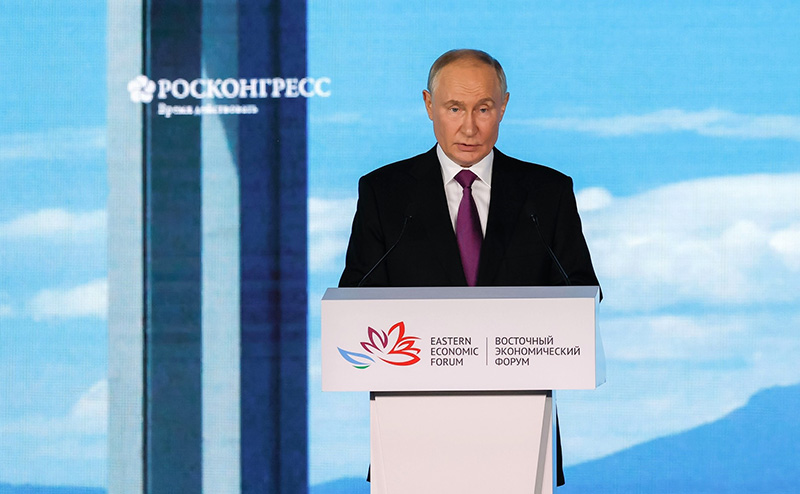 Photo: Kremlin.ru
Photo: Kremlin.ru
The President of Russia Vladimir Putin took part in the 9th Eastern Economic Forum (EEF) plenary session.
The Far East has become "the most important factor in strengthening Russia's position in the world," the country's "flagship" in the new global economic reality, Russian President Vladimir Putin said at the plenary session of the EEF.
The forum’s slogan this year is – “Far East 2030. Combining Strengths to Create New Potential”.
Vice President of the People's Republic of China Han Zheng and Prime Minister of Malaysia Anwar Ibrahim also participated in the session.
The discussion was moderated by Deputy Editor-in-Chief of the Russia 24 news channel Alexandra Suvorova.
TASS has collected the key statements the Head of State made at the forum:
On the Importance of the Far East
"The most important business ties, trade routes and the whole direction of development are increasingly being reoriented to the East and the Global South," he said. The Far Eastern regions "provide direct access to these growing and promising markets, allowing us to overcome the barriers that some Western elites are trying to impose on the world."
On the economy of the future
According to Putin, the economy of the future "is built around people," meaning one should not build industrial facilities where there is no social infrastructure. Not only is this unfair, but it simply does not work in the modern economy.
On nuclear power plants in the Far East
"I ask you [the authorities – TASS) to think about building nuclear power plants in the Far East," Putin said.
On mortgages
"I propose to put an end to this matter. Keep the rate for Far Eastern and Arctic mortgages unchanged, namely 2% per annum," the President said. He instructed the authorities to raise the mortgage benefit for large families in all Far Eastern regions with low birth rates to 1 million rubles ($11,000).
On the role of the EEF
Agreements worth more than 10.5 trillion rubles ($116.4 bln) have been signed at the last three Eastern Economic Forums. "The Eastern Economic Forum has become a recognized platform for establishing strong business contacts and discussing strategic issues of developing Russia's Far East and the entire Asia-Pacific region," Putin stated.
On BAM
The Baikal-Amur Mainline (BAM) should become not only fully double-track, but also fully electrified. Russia is ready and able to implement global-scale transport projects, "build quickly, in large quantities and with high quality."
On resources
Russia must ensure its own resource sovereignty "for an uninterrupted supply" of affordable fuel and raw materials to the country. The Far East has the potential to explore for and extract titanium, lithium, niobium, rare earth metals and other resources "that are required in the economy of the future."
On the special administrative region of Russky Island
Over 5.5 trillion rubles ($60.9 bln) have returned from offshore zones and foreign jurisdictions to the special administrative region of Russky Island.
On the Northern Sea Route
The volume of freight traffic along the Northern Sea Route has increased five times compared to Soviet times and has already exceeded 36 million tons.
On international priority development areas in the Far East
The authorities need to speed up work on the bill to develop territories in the country's Far East.
On logistics project with China
A joint project between Russia and China to develop Bolshoy Ussuriysky Island in the Khabarovsk region is expected to be launched as early as 2025. "I am confident that it will give a good, powerful impetus to the development of Khabarovsk and the entire region," Putin said.
On drones
Russia plans to launch a project on unmanned aerial vehicles for civilian purposes in the Far East.
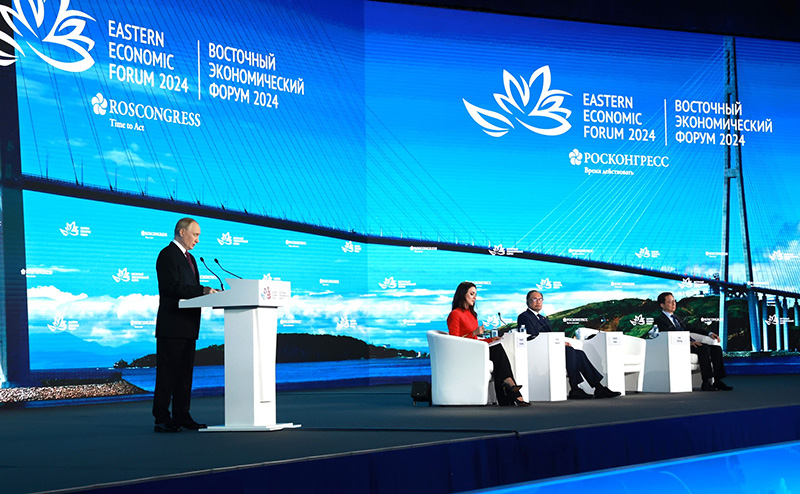 Photo: Kremlin.ru
Photo: Kremlin.ru
TASS has gathered the key statements made by the President during the discussion:
The Kursk Region
By attacking the Kursk Region and other border areas, Ukraine wanted to distract Russia from its offensive in Donbass. This strategic gambit failed as Kiev severely weakened itself in other directions, while the Russian army only accelerated its offensive. The Ukrainian armed forces' losses are so great that the country's army may soon lose its ability to fight: "The enemy is suffering heavy losses – both in manpower and equipment."
Protecting Russia's border regions from attacks by the Ukrainian armed forces is the "sacred duty" of the Russian Armed Forces. The number of contract servicemen has "sharply increased" after the Ukrainian attack on the Kursk Region.
Ukraine strikes NPPs
Ukraine's strikes on the Zaporozhye and Kursk nuclear power plants are "blatant terrorist attacks." "One can only imagine what would happen if we gave a tit-for-tat response, what would happen to this part of Europe."
Settling the Ukraine conflict
In settling the Ukrainian crisis, Russia will seek "guarantees that could work at least to some extent." The West and the Kiev authorities abandoned the 2022 Istanbul agreements on the settlement in Ukraine in favor of trying to deal a strategic defeat to Russia, which "is not working."
Russia has never refused to negotiate on Ukraine, but will not do so based on "some ephemeral demands, only on the grounds of those documents that were agreed and actually initialed in Istanbul."
Moscow and Kiev managed to agree on the settlement of the conflict in March 2022 in Istanbul. The only reason the agreements did not go into force was because the West put a stop to the process.
Russia will always defend its interests and the interests of people in Ukraine who espouse the Russian language and traditions.
The dollar
Russia is not pursuing a dedollarization policy: "We did not refuse to settle accounts in dollars. We were denied settlements, and we just have to look for other opportunities. That's all." The West already realizes that it has made a mistake by foolishly pushing countries to abandon the dollar.
The Russian economy
The Russian economy is already the fourth-largest in the world, while the gap between China and the US is widening. It is developing steadily, but "one must always strive to reach new milestones."
Russia's GDP growth for the first half of 2024 is 4.6%, with the rise expected to eclipse 2023's by year's end. Inflation in the country is now on the decline, although it recently exceeded 9% with a target of 4%.
The Russian authorities are already "cooling" the situation on the lending market and in the economy as a whole by raising the key rate and canceling certain preferential mortgage programs.
BRICS
Countries of the Global South account for more than half of global GDP, while BRICS countries account for a third. "Priorities in the use of certain currencies are naturally changing as well."
Telegram CEO Pavel Durov's case
The Russian authorities have never had any problems with Telegram founder Pavel Durov, unlike other countries.
US election
It is the American people who will determine the winner of the US presidential election, so Russia does not need to talk about who it prefers or doesn’t prefer.
Prisoners swap
The prisoner exchange between Russia and the West that took place in August was "a win-win for all parties involved." Russia will always help its citizens who need help, including those living abroad.
Gas transit
Russia does not refuse to transit its gas through Ukraine: "We have a contract for transit, which terminates on December 31 this year. But if Ukraine rejects this transit, well, we can't force them."
Germany's refusal to launch the remaining string of the Nord Stream 2 pipeline is "schizophrenia and nonsense:" "Why don't they do it? I don't understand."
The expansion of Russian gas supplies to the Far East and Central Asia is not related to the events in Ukraine: "The economies of these countries are developing rapidly, so they need additional resources.
Iran requests Russia to supply gas, which is "quite a realizable project."
The Middle East
Russia is striving to resolve issues related to the release of hostages held by the Palestinian radical Hamas movement in the Gaza Strip and is making progress on the matter.
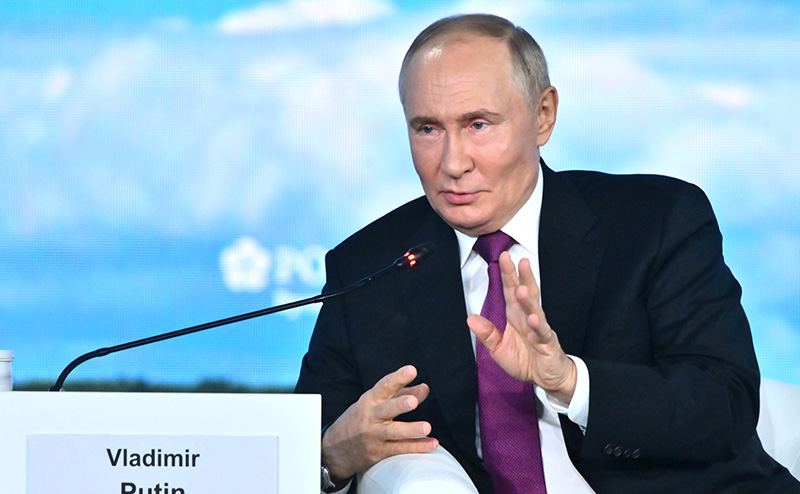 Photo: Kremlin.ru
Photo: Kremlin.ru
TASS informs as the general information partner of the EEF:
- More than 1,000 agreements totally worth over 10.5 trillion rubles ($117.5 bln) were signed at three previous Eastern Economic Forums, Russian President Vladimir Putin said at a plenary session of the Eastern Economic Forum (EEF).
"I would note that at three previous forums alone more than 1,000 agreements totally worth over 10.5 trillion rubles were signed. By the way, the Eastern Economic Forum has become an acknowledged platform for establishing firm business ties and discussing strategic issues of the development of Russia’s Far East and the whole Asian-Pacific region," he said.
Representatives of more than 75 countries and territories participate in the events of this year’s forum, with over 100 panel sessions and roundtables to be held overall, Putin added. "It is important that those discussions come with a detailed business dialogue and lead to specific investment decisions and trade agreements," he stressed.
- The rates of growth of capital investment in the Far East climbed three-fold in a decade, Russian President Vladimir Putin said at a plenary session of the Eastern Economic Forum (EEF).
"Capital investment growth rates in the Far East surged three-fold in a decade, and they are three times higher than Russia’s average. The results of those investments are also demonstrable as around 1,000 new enterprises operate, with over 140,000 jobs having been created," he said.
A conceptually new strategic program and a system for comprehensive development management were launched in the region in 2013, thanks to which more than 3,500 industrial, infrastructure, technological and educational projects have been launched or are about to the launched in the Far East, Putin added.
- Russia should ensure its own resource sovereignty for uninterrupted supplies of affordable fuel and commodities to the country, President Vladimir Putin said at a plenary session of the Eastern Economic Forum (EEF).
"We should ensure the country’s resource sovereignty, form a stable basis for uninterrupted supplies of affordable commodities and fuel to our regions, cities and settlements, create a basis for production of new materials and energy sources," he said.
It should be done using more efficient domestically-produced technologies and scientific research results in the area of environment, the president stressed.
According to Putin, 100% of Russian wolfram, tin, fluorspar, borax, 80% of diamonds and uranium, over 70% of silver and 60% of gold is currently produced in the Far East. "That said, deposits have been developed for a long time and they are objectively limited in key production centers, including Yakutia, Chukotka. Whereas the demand for mineral resources is on the rise, and not only for export, but on the domestic market as well," the president said.
- The Far East has become the most important factor in strengthening Russia's position in the world, Russian President Vladimir Putin said at the plenary session of the Eastern Economic Forum (EEF).
"The most important business ties, trade routes and the entire vector of development are increasingly being reoriented to the East and the Global South. Our Far Eastern regions provide direct access to these growing and promising markets, allowing us to overcome the barriers that some Western elites are trying to impose on the world. And most importantly, as I said, our Far East is a vast space for business initiatives to launch complex projects and create entire new industries. In fact, today the Far East has become, without any exaggeration, the most important factor in strengthening Russia's position in the world, our flagship," the president emphasized.
Putin pointed to the fact that Russia and the Far East traditionally welcome at the beginning of September representatives of business, technology teams, government agencies and specialists – those who are interested in the region and the "limitless opportunities for creation and partnership" that this territory offers.
The president recalled that the development of the region was defined as a national priority for the 21st century, noting that the correctness of this decision has been confirmed by life itself, the challenges facing Russia and the trends that are gaining momentum in the global economy.
- Protecting Russia's border regions from Ukrainian attacks is a sacred duty of the Russian armed forces, President Vladimir Putin said at a plenary session of the Eastern Economic Forum (EEF).
"When we talk about these issues, first of all we should think about people who are certainly going through serious trials and suffering from these terrorist acts. It is the sacred duty of the [Russian] armed forces to do everything to kick the enemy out of these territories and to reliably protect our citizens. And, of course, the whole country must do everything to support people," he emphasized.
- Russia is ready and able to implement transport projects of global scale, "build quickly, much and with quality," President Vladimir Putin said at a plenary session of the Eastern Economic Forum (EEF).
"I should stress that great work indeed is in progress both in the Eastern polygon of railways and at all major highway facilities of Russia, with specialists, engineers, designers from many regions of the country involved in it," he said, adding that "Russia is able and ready to construct quickly, much and with quality, implement infrastructure, transport projects of national and global scale in the full sense of that word."
Among such projects is the development of the Northern Sea Route as an international supply route, the president added. Over the past 10 years its traffic flow rose considerably as 4 mln tons of cargoes were carried in 2014, while last year over 26 mln tons were delivered, he noted.
- Russian President Vladimir Putin said that he has not called the leaders of Europe and the United States for a long time, but Moscow does not refuse contacts.
"We have not called representatives of some European countries and the United States for a long time. Although we have not refused these contacts. They limit them," he said at a plenary session of the Eastern Economic Forum (EEF).
"Although, of course, certain information can be exchanged through various channels. First of all, through the channels of the Foreign Ministry," Putin added.
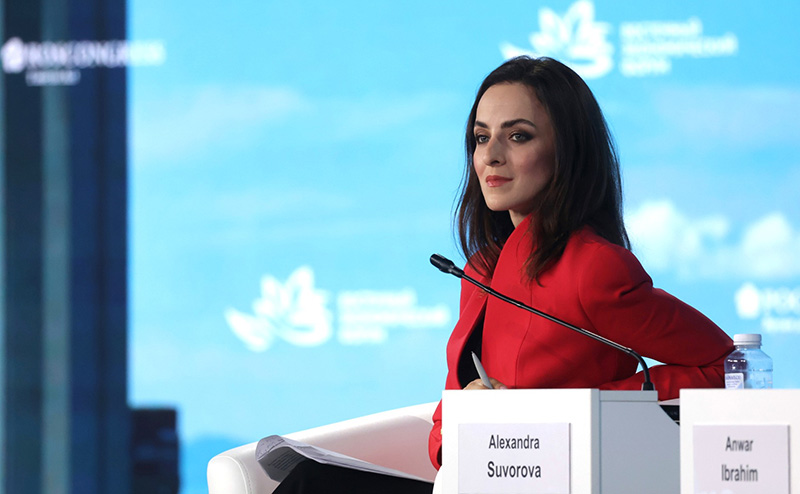 Photo: Kremlin.ru
Photo: Kremlin.ru
- Washington successfully leveraged World War II to expand the influence of the dollar, Russian President Vladimir Putin said speaking at the plenary session of the Eastern Economic Forum.
"The United States, naturally, took advantage of the results of World War II in the economy and implemented the Marshall Plan. There, for Europe, they created a single global system, the Bretton Woods system. Then, of course, they tinkered with it a bit. They created a single world currency – the dollar. This depended and still depends – let me repeat this – on the strength of the country's economy," Putin said.
"The main point is that the currency of a country reflects the economic power of the state. The larger this economy is, the more partners it has, the more in demand is the national currency of this or that country in settlements. Naturally, you see that when a specific economy has many partners, there is a need to use the currency of this country. Therefore, the use of the currency of a particular country depends on the role of its economy in the world," Putin added.
- The West and the Kiev authorities abandoned the Istanbul agreements on a settlement in Ukraine in order to achieve Russia’s strategic defeat, but to no avail, Russian President Vladimir Putin said while speaking at the plenary session of the Eastern Economic Forum.
"We had practically achieved all parameters of a possible peace agreement with representatives of the government in Kiev. We agreed on everything. Moreover, Ukraine’s chief negotiator (David Arahamiya - TASS), who still heads the faction of the ruling party in the Verkhovna Rada, authorized these agreements," Putin pointed out. "True, there were still some details to be finalized, but on the whole the approval is still valid. It's a document. But then Mr. [Boris] Johnson (who served as British prime minister - TASS) arrived, as it is known - the British authorities confirm this - and instructed the Ukrainians to fight to the last Ukrainian. Which is happening today in an attempt to achieving Russia's strategic defeat." "This does not work," Putin said.
The Ukrainian authorities, he recalled, have publicly stated that "if they had then carried out what we agreed with them and not obeyed their masters from other countries, the war would have stopped a long time ago."
"But they took a different path. The result is in sight," the Russian leader stated.
Russia has never refused to negotiate on Ukraine, Putin emphasized, but not on the basis of some ephemeral demands, but on the basis of the Istanbul agreements. "Are we ready to negotiate with them? We have never refused to do so. But not on the basis of some ephemeral demands, but on the basis of the documents that were agreed and actually initialed in Istanbul."
- The volumes of Russian gas supplies to Europe will go down if Ukraine refuses to transit it, though "this is their choice," President Vladimir Putin said at a plenary session of the Eastern Economic Forum (EEF).
The main consumers of Russian gas in Europe are apparently reluctant to make Ukraine maintain transit though rendering comprehensive assistance to Ukraine, military, financial and "any [support] you like," he said. "However, now Ukraine refuses to transit [Russian gas], which means gas volumes delivered to Europe will decrease. They will flow via other routes, through TurkStream in particular, probably partially through Blue Stream to Turkey again," Putin noted.
Those supplies will also facilitate Europe’s energy stability, he said. "This is their choice though. I don’t know in full how it will affect them," the president added. Transit is one of obligatory elements of the work on supplies of gas to Europe, Putin noted. "There is a transit contract, which expires on December 31. However, if Ukraine rejects this transit, well, we cannot force it," he said.
- Russian President Vladimir Putin said he has only met Telegram founder Pavel Durov once, a meeting that took place "long ago" in Moscow when the businessmen shared his business plans with him.
"I once met with Mr. Durov in Moscow, it was long ago. He just shared his plans. I hold regular meetings with business leaders, and I had a meeting [with Durov] at the Kremlin long ago," Putin said at a plenary session of the Eastern Economic Forum (EEF).
The Russian leader said he has not met with Durov since then, as he refuted allegations that he held a meeting with the businessman during his recent trip to Baku. "We have never stayed in touch with him, why should we meet in Baku? I didn’t even know he was there," Putin said, adding that he believed Durov was living in Moscow before learning that the businessman resides in Dubai.
However, Putin emphasized that he never refuses to meet with businessmen at various venues.
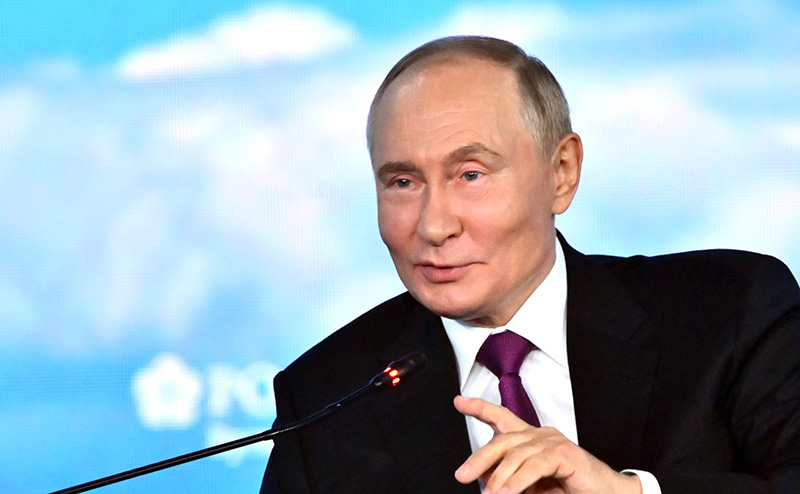 Photo: Kremlin.ru
Photo: Kremlin.ru
- After incumbent US President Joe Biden was "withdrawn" from the presidential race, Moscow came "to back" his successor Kamala Harris, Russian President Vladimir Putin said.
"Like I said before, the current president, Mr. Biden, was our guy, if I may say so. He was withdrawn from the race but asked his supporters to back Ms. Harris. This is what we are doing; we will back her," Putin noted at the plenary session of the Eastern Economic Forum (EEF).
"At the end of the day, the choice is up to the American people and we will respect it," the Russian president stressed. "As for favorites, we don't have a say in this. After all, it’s up to the American people to decide," the head of state added.
The Russian president also joked that Harris’ "laughter is so expressive and contagious," that you can assume "she’s doing well." Putin reminded that ex-US President Donald Trump "imposed more sanctions on Russia than any president before him." "So, if Ms. Harris is doing well, then perhaps, she will refrain from taking such steps," the Russian leader said.
- The lack of a neutral position of the United States on the Israeli-Palestinian conflict is a problem for the settlement, Russian President Vladimir Putin said.
"Today's problem is connected, among other things, with the US attempts to monopolize the settlement. Because the US is not seen as a country with neutral positions. And this is the problem," he said at a plenary session of the Eastern Economic Forum (EEF).
According to the Russian president, the unresolved two-state solution is at the heart of today's escalation of tensions. "Russia's position is not conjunctural. It has always been based on the decisions that were made earlier and which, in my opinion, should be the basis of the settlement," Putin said. "This is, first of all, the creation of two independent states. By the way, this position is shared by many people in the world, including, strangely enough, many in the United States. But, unfortunately, this issue has not been resolved, and it is the basis of today's escalation of the situation, today's confrontation," he pointed out.
Russia will do everything it can "to contribute to the settlement of this long-standing and very difficult crisis," Putin said. He revealed that he had spoken about this at a meeting in Moscow with Palestinian President Mahmoud Abbas.
In addition, the Russian side is trying to resolve issues with the release of hostages held by Hamas in the Gaza Strip and is achieving some results. "As for the humanitarian issue, of course, we are trying to resolve the issues related to the hostages," the Russian leader said. "And we are achieving certain results here, which we are very happy about. And we will try to do it in the future," he said.
- Moscow and Kiev managed to agree on settling the conflict back in March 2022 in Istanbul, but the accords did not come into effect only because of orders given by the West, which aims to strategically defeat Russia, Russian President Vladimir Putin said at the plenary session of the Eastern Economic Forum (EEF).
"We managed to reach an agreement, that’s the entire thing, and the signature of the head of the Ukrainian delegation who initialed this document testifies to this fact, which means that the Ukrainian side on the whole was satisfied with the achieved agreements. They did not come into effect only because they were ordered not to do that. The elites of the US, Europe, and several European countries desired to achieve Russia’s strategic defeat," he said.
The head of state noted that Russia has never rejected and does not reject holding negotiations but only on the basis of talks reached and documented back then in Istanbul.
- The August prisoner swap exchange between Russia and the US was a win-win for everybody involved, Russian President Vladimir Putin said at the plenary session of the Eastern Economic Forum (EEF).
"At the end of the day, I think the process produced a positive result for all participants. The return home of our citizens, including those who performed special missions abroad in the country’s interests, was definitely the biggest achievement," he said, drawing applause from the audience.
When asked about the prospects of Russians currently in custody in the US returning home, Putin stressed that Russia was always ready to provide assistance to citizens in need, including those abroad. "We always treat all Russian nationals in need of the government’s assistance equally, and we will maintain this approach in the future," the head of state said.
"As for the exchanges that took place recently, many countries took part in this work, in this mission. In particular, talking about the US reporter who was disguised as a journalist but in fact was performing intelligence missions (Wall Street Journal reporter Evan Gershkovich - TASS), the Saudi crown prince played an active role in the beginning stages of his release. We are grateful to him, too, because it eventually led to getting our guys back home," Putin stressed. "There also was the Turkish president, Mr. Erdogan, who provided a platform to finally resolve these issues, as well as some Arab countries that showed goodwill in the process," he added.
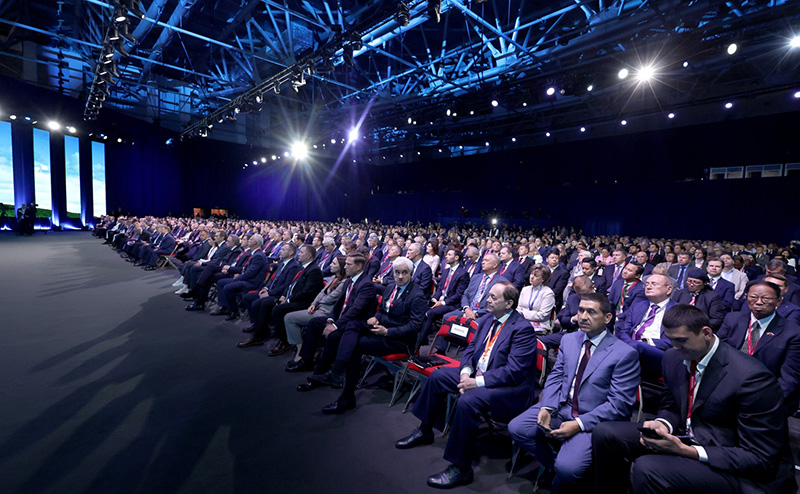 Photo: Kremlin.ru
Photo: Kremlin.ru
- The leaders of China, Brazil, and India are making a sincere effort to contribute to resolving the situation in Ukraine, Russian President Vladimir Putin said, addressing the plenary session of the Eastern Economic Forum (EEF).
"We respect our friends and partners, who, I believe, sincerely seek to resolve all issues surrounding this conflict, primarily China, Brazil and India. I constantly keep in touch with our colleagues on this issue," Putin said. "I have no doubt that those leaders - and we maintain a trusting relationship - are making a sincere effort to navigate the ins and outs of this complicated process which clearly began with the 2014 coup in Ukraine," he added.
Russia will always protect its interests and the interests of people in Ukraine who fight for their rights to speak Russian and for their traditions, the Russian leader emphasized. "We will definitely protect our interests and the interests of people who are close to us, those who espouse the Russian language and the Russian culture, Russian traditions," Putin concluded.
- Russia is among mining leaders globally but the use of electric power for these purposes should not restrain development of regions, President Vladimir Putin said at the plenary session of the Eastern Economic Forum.
"I think Russia is already among global leaders in mining," the head of state said. The leadership is "related to the surplus of energy capacities in Siberia," Putin noted. "Certainly, we are happy that the business working in this sphere earns good revenues but this surplus of energy resources in Siberia should not turn into a deficit that can be a constraining factor for development of Siberian regions," the president said.
"Mining is good but construction of housing, industrial and social facilities and power supplies to production facilities planned for construction is no less and probably even more important," he added.
- Anyone who talks about cutting off Russian energy supplies is speaking purely out of emotion, and doesn’t understand how arrogant this sounds, Russian President Vladimir Putin said at the plenary session of the Eastern Economic Forum (EEF).
"After all, when our detractors and those who impose illegal sanctions, about which the Vice-President of the People's Republic of China [Han Zheng] spoke, do this, they are guided by emotions, not by reason, as they say in such cases. Because there is no result. What are they guided by? Arrogance and self-assurance," he said.
Putin pointed out that it is impossible to simply cut off Russian energy supplies. "It's just not feasible, do you understand? It is impossible. Imagine if tomorrow, all our gas, oil, and so on was blocked," the Russian leader said. "The global economy couldn’t handle this. Prices would simply go through the roof, but they would still buy. It is impossible without them. That's the whole point," he pointed out.
At the same time, the president emphasized that Russia will solve its problems even if some country refuses Russian energy resources. "Yes, with some losses, but we will solve them anyway. And those who do not want to cooperate with us, well, then let them suffer losses," he said. "We see what is happening in European countries. Many of them are on the verge of recession. And the situation will get worse," he underscored.
- Countries of Global South and Russia need to ensure their global leadership and this goal will be achieved, President Vladimir Putin said at the plenary session of the Eastern Economic Forum.
"As regards Russia, we should ensure development of the economy on internal process decisions with high-skilled, trained and motivated staff. Concerning all of us together, I mean countries of the Global South in the broad sense of this word, then, certainly, we should provide for global leadership in the economy. I mean development rates of the global economy and the pace of our countries’ development – this task will be definitely performed," Putin said.
The Russian leader thanked Prime Minister of Malaysia Anwar Ibrahim and Vice President of China Han Zheng that participated in the plenary discussion "for their outstanding statements and participation in our work, for the attention to developments in Russia and the Russian Far East."
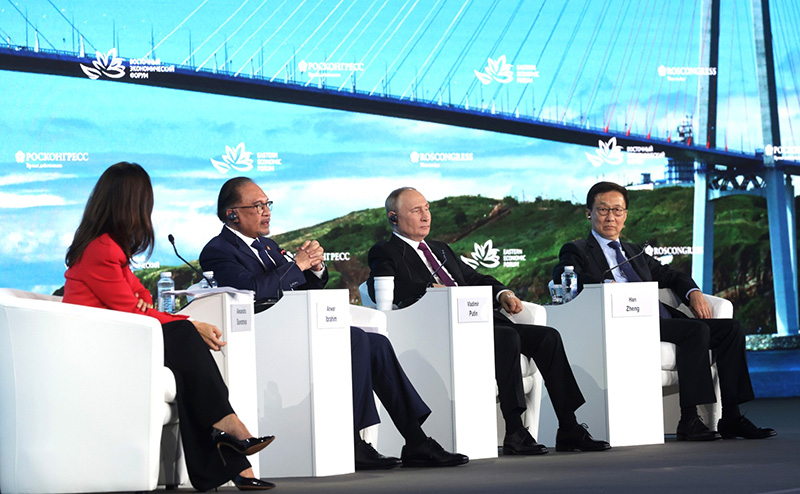 Photo: Kremlin.ru
Photo: Kremlin.ru
- Russian authorities are already "cooling down" the situation in the lending market and in the economy on the whole, President Vladimir Putin said at the plenary session of the Eastern Economic Forum.
"Already cooling down," the head of state noted. "By increasing the key rate, by canceling subsidized mortgage," the Russian leader noted. "Lending is now supported by IT benefits, [programs] in the Far East, in the Arctic, by family mortgage, but this 'cooldown' is also supported in such way," Putin said.
The stable work of the Ministry of Finance on budget balancing also influences the "cooldown" in the national economy, the Russian leader added.
- Increased gas supplies from Russia to the east and Central Asia are not directly related to what is going on in Ukraine, Russian President Vladimir Putin said at the plenary session of the Eastern Economic Forum (EEF).
"I have already said that we have almost reached capacity in terms of supplies to China. As for supplies to Central Asia and Iran, they aren’t related – I would like to make that clear – to developments in Ukraine. It’s just that these countries’ economies are actively developing and they need additional resources, that’s all," Putin noted.
In this regard, he mentioned Uzbekistan, where the population is growing quickly alongside a rapidly progressing economy.
"Look at Uzbekistan – I have already spoken about it and it is a well-known fact – the country’s population grows by one million every year. Can you imagine that? A million more people every year. The population currently stands at 37 million people there. Clearly, the number will reach 40 million very soon and will continue to increase. You see, the economy is also growing. Besides, they also have obligations on foreign markets. The country certainly needs additional resources. The temperature fell to minus 21 degrees Celsius (minus 5.8 degrees Fahrenheit – TASS) in [Uzbekistan's capital of] Tashkent at some point the year before last, which is unheard of. That said, they have their needs and we have the necessary resources. We will also coordinate our activities with Turkmenistan," Putin said.
- Russia will gradually scale up natural gas supplies to other regions of the world instead of Europe, President Vladimir Putin said at the plenary session of the Eastern Economic Forum.
"We will gradually build up our deliveries to other regions of the globe. We have a good supply project for the People’s Republic of China long since, before these various crises in Europe and in the Ukrainian destination. We will reach the design capacity of 38 bln cubic meters next year," Putin said. Other gas supply routes are also being studied, he noted.
The Far Eastern route to China for 10 bln cubic meters of gas more will also be launched, Putin said. "I reiterate, this is not related to developments in Ukraine. These are simply our agreements reached many years ago. We are implementing all that," he added.
Russia will also develop natural gas liquefaction, the president said. Certain difficulties also exist in this sphere that are managed to be overcome, Putin stressed.
- Iran has been asking Russia to supply gas, this is a quite feasible project, Russian President Vladimir Putin said speaking at the plenary session of the Eastern Economic Forum (EEF).
"Iran has been asking us for supplies for a long time. Well, this is also a very convenient place for us, the field is nearby. I believe that this is a quite feasible project, I mean that the markets are huge. And there is simply a huge need in in the countries neighboring Iran," Putin said.
According to him, Gazprom will restore gas supply volumes both through new markets and to the domestic market due to the growth of the Russian economy.
"There are different possibilities here. And we will develop different markets, we will work on swaps, we will liquefy, as I have already said, and so on. Of course, we will gradually restore sales volumes. There is no doubt about this. And we will develop our own economy. In many regions of the Far East, we do not have enough gas generation. We need to unite – Gazprom has such plans – the European part of the gas transportation system and the Far Eastern part in order to carry out the flows accordingly. All this is in our plans, all this will be implemented," Putin noted.
- Russian revenues will drop upon contraction of gas supplies to Europe but Gazprom will supply more gas inside the country, President Vladimir Putin said at the plenary session of the Eastern Economic Forum.
"There will be a certain decline in revenues for us but never mind. Gazprom will supply more inside the country. This is also good," Putin said.
The ones supplying energy resources to Europe take care of their national interests in the first instance, the Russian leader said. The president cited the US as an example, with its gas price for Europe being 50-60% above the Russian gas price. "Certainly, the economy of Europe, including Germany, relying on our energy resources, experiences very serious challenges. Many industries simply close. However, this is not our choice. We are ready," he noted.
- The work on providing Russia with sufficient power generation capacities shall be implemented in time and be economically feasible, Russian President Vladimir Putin said at the plenary session of the Eastern Economic Forum.
Surplus generation capacity is present in some regions, for example, in Siberia, while there is capacity deficit in others like the Far East, the head of state noted.
"Not merely timely repairs but deep upgrade should also be thought of in the European part. Therefore, plans are in place – some of them were developed and the other ones were approved. The most important is to timely perform everything, establish economically feasible work in this sphere and make decisions in time," Putin added.
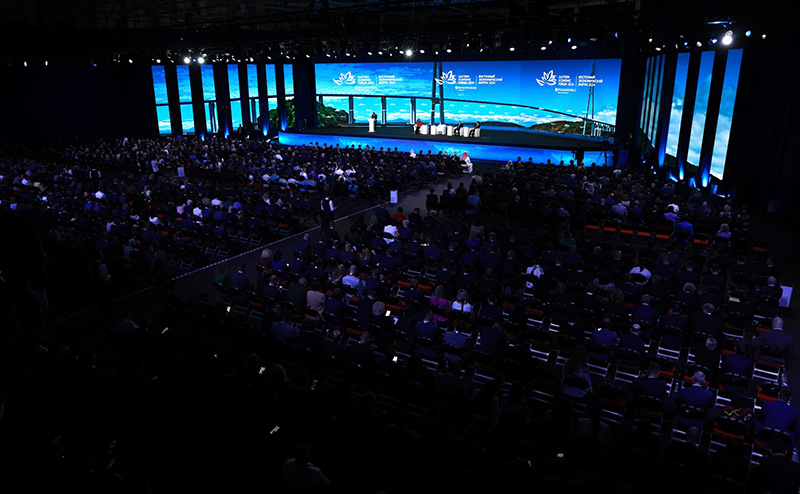 Photo: Kremlin.ru
Photo: Kremlin.ru
- Russia's economy is already fourth in the world, while the gap between Chinese and US economies is widening, Russian President Vladimir Putin said speaking at the plenary session of the Eastern Economic Forum (EEF).
"Today, the Chinese economy – as we know well – is first in the world in terms of purchasing power parity. Yes, the American economy is powerful, good, its structure favorably differs from others. But the volume of the Chinese economy is larger. The US comes second. But the gap between the two economies is constantly widening every year. This is also related to the use of the yuan in international settlements. The US is in second place, India is in third. Russia is already fourth in the world in terms of purchasing power parity," Putin said.
He noted that Russia has overtaken the leading economy of Europe, which is Germany.
"I will repeat once again: Japan, Germany, the USA – they have many advantages, primarily related to the structure, the high-tech sector, and so on. But the size of the economy is also important, because it makes it possible to invest resources in the most promising industries and areas. Therefore, I repeat once again, this is a natural process, not even related to the political situation. But with their careless unprofessional actions, the authorities of Europe and the United States are simply pushing this process," Putin said.
- The Russian leader also touched upon relations between the BRICS countries.
"Russia, China, India – these are, as they say, the founding fathers of this organization. In 2005, we began this process by forming RIC – Russia, India, China. Then Brazil joined, then South Africa. Now we have expanded the circle of participants, and this is a very good process. More than 30 countries today show their readiness to cooperate, and some of them are ready to join BRICS. The new members of BRICS are self-sufficient countries, with rapidly developing economies, with their own distinctive culture. These are very interesting states, and they will certainly make their positive contribution to the development of the organization," the Russian president added.
- Ukraine has failed to interrupt the advance of Russian forces in Donbass by attacking the Kursk Region and other borderline Russian regions, Russian President Vladimir Putin said at the plenary session of the Eastern Economic Forum (EEF).
"The enemy’s goal was to unsettle us, throw us off our game, make us shift troops and stop our advance at the key sectors of the line of engagement, primarily in Donbass the liberation of which is our priority goal," Putin emphasized. "Did they succeed? No, the enemy failed completely," he added.
The president said the Russian Armed Forces "have stabilized the situation as they have been gradually squeezing the enemy out in border areas."
- Russia does not refuse to supply gas through Ukraine, but if Ukraine refuses to transit gas, Russia cannot force them to do so, President Vladimir Putin said at the plenary session of the Eastern Economic Forum.
"As for Ukraine, we do not abandon this transit, oddly enough. Why? Because we and Gazprom intend to fulfill all of their obligations to our clients, with whom we have long-term contracts," he said.
The president recalled that one of the mandatory components of work on gas supplies to Europe is transit.
"There is a transit contract that expires on December 31 of this year. But if Ukraine refuses to transit, well, we cannot force them," Putin noted.
The head of state noted that the main consumers of Russian gas in Europe apparently do not want to force Ukraine to maintain transit, although they provide Ukraine with comprehensive assistance, military, financial and "any kind of" support.
"But if Ukraine refuses our transit, that means that we will cut volumes of gas that go to Europe. They will go along other routes, in particular, through the TurkStream, perhaps partly through the Blue Stream to Turkey," Putin noted.
According to him, these supplies will also help energy stability in Europe. "But this is their choice. How this will affect them, I do not know for sure. We are dealing with our issues, and let them deal with theirs," the President added.
- The countries of the Global South account for more than half of global GDP, and BRICS countries – for a third, which affects the transition in settlements from the dollar to national currencies, Russian President Vladimir Putin said speaking at the plenary session of the Eastern Economic Forum (EEF).
"Now the situation – and the Prime Minister [of Malaysia] has just mentioned this – is changing in the global economy. Already today, the countries of the Global South account for more than 50% of global world GDP. And BRICS countries represent about one-third of the global economy. And naturally – let me stress it – priorities in the use of certain currencies are changing. Together with our BRICS partners we use national currencies, this is already about 65%," Putin said.
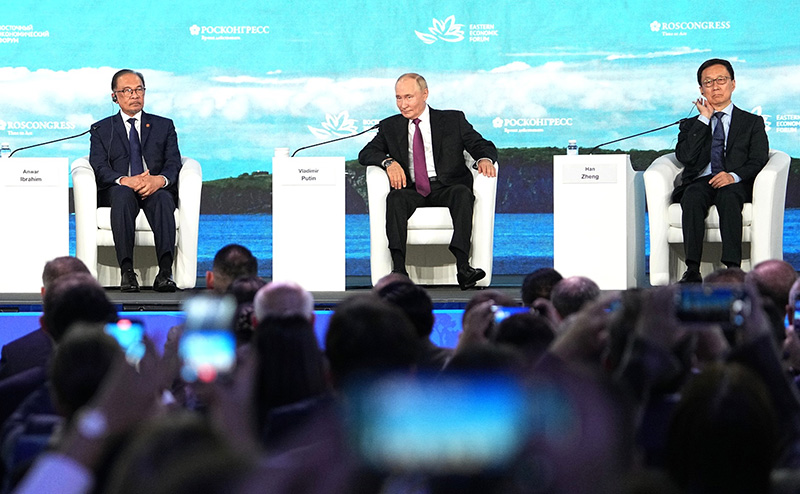 Photo: Kremlin.ru
Photo: Kremlin.ru
- A joint Russian-Chinese project to develop Bolshoy Ussuriysky Island in Russia’s Khabarovsk Region should be launched as early as 2025, Russian President Vladimir Putin at the plenary session of the Eastern Economic Forum.
"In May this year, during a state visit to China, we agreed with our Chinese colleagues to work together on this project. I am confident that it will give a good, strong boost to the development of Khabarovsk and the entire region. I ask the government to resolve all organizational and financial issues in order to start implementing this plan as early as next year, in 2025," the Russian leader said.
According to him, the project includes the creation of large logistics complexes in the region, new checkpoints on the state border, and the expansion of the road network. Putin emphasized that this is a good example of cooperation with foreign partners, as well as investment in construction and job creation.
- The West already understands that it made a mistake, and its stupid steps are only pushing countries to abandon the dollar, Russian President Vladimir Putin said speaking at the plenary session of the Eastern Economic Forum.
"The financial and political authorities of the United States are pushing this process with their not just sloppy, but unprofessional and stupid actions. I think, they already understand that they made a mistake, but they simply cannot get out of this rut. It is probably rather embarrassing for them to admit that they made a mistake. They should have already made some corrections, as they see that the tools they use do not work," Putin said.
He noted that in this situation, Russia and its friendly countries are switching to national currencies in their mutual settlements. But the Western leaders are not ready to abandon their policies, he added.
"Apparently, only those people who will replace today's generation of politicians can do this. Because changing something means admitting your mistakes. Apparently, this is difficult. And what is the reason for such behavior? Apparently, they were counting that everything would collapse in our country. That is why they banned us from dollar service. But the trends are not obvious. They only push, as I have already said, these processes, but the trends in the use of currency are connected with the growth of the [Russian] economy," Putin said.
- The Baikal-Amur Mainline (BAM) should become not only fully double-track, but also fully electrified, Russian President Vladimir Putin said at the plenary session of the Eastern Economic Forum.
"Along the entire length of the BAM, we need to lay continuous second tracks, and we need to think about the future now. I believe that we need to make the BAM not only fully double-track, but also electrified," he said.
The modernization of BAM is an even larger-scale project than its construction in the USSR, Putin noted.
"Today we are implementing a project that is larger in scale than the largest infrastructure investment project of the Soviet Union, implemented by all the republics of the USSR. And with a huge strain of forces," he said.
The president added that 3,100 kilometers of railway track will be laid in the next eight years. "For comparison, the same amount was laid during the first and second stages of the expansion of the BAM and the Trans-Siberian Railway combined. And the same amount during the years of the construction of the BAM," Putin noted.
- Russian President Vladimir Putin expressed his bewilderment at the plenary session of the Eastern Economic Forum that Germany was still refusing to start the remaining Nord Stream 2 gas pipeline.
"I simply cannot understand it. Nord Stream, the gas pipeline along the Baltic Sea bottom, was blown up. Both strings of the Nord Stream and one string of the Nord Stream 2 were blown up. By the way, one still exists, it is in operable condition. What is preventing said German government from pulling the trigger, coming to terms with us and turning it on?" Putin asked.
If Nord Stream 2 is brought back online, 27.5 bln cubic meters of gas would immediately go to Europe, the Russian leader stressed. "Why don’t they do it? I don’t understand. They can receive gas via the territory of Ukraine, via the TurkStream, but they can’t through the string running along the bottom of the Baltic Sea. In my opinion, this is a kind of professional malpractice. Insanity, simply nonsense. Why? If they do not want to – fine," Putin added.
...The Eastern Economic Forum is underway on the campus of the Far Eastern Federal University in Vladivostok on September 3-6, 2024. The main theme of the EEF this year is ‘Far East 2030. Combining strengths to create new potential’. The Roscongress Foundation is the Forum’s organizer. TASS is the general information partner of the EEF.
read more in our Telegram-channel https://t.me/The_International_Affairs

 17:59 05.09.2024 •
17:59 05.09.2024 •






















